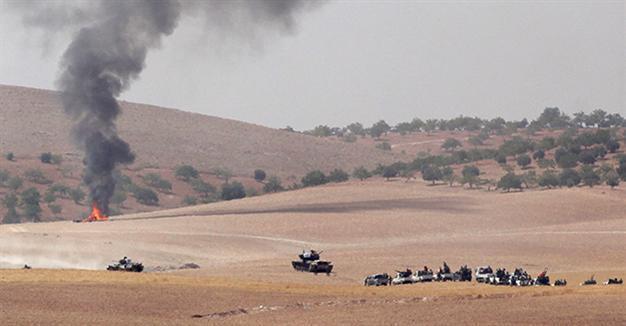Syria split between Turkey, US remains
WASHINGTON / ANKARA

REUTERS photo
Tension between Ankara and Washington over Kurdish forces in Syria is continuing to simmer amid contradicting statements on Turkey’s recent military operation on Syrian soil, with the latter insisting that Turkey should hit the Islamic State of Iraq and the Levant (ISIL) but not Syrian Kurdish fighters, whom Turkey describes as “terrorists.”Despite the differences, Turkish and Kurdish forces in northern Syria have reached a “loose agreement” to stop fighting each other, a U.S. defense official told Agence France-Presse on Aug. 30.
“In the last several hours, we have received assurance that all parties involved are going to stop shooting at each other and focus on the ISIL threat,” said Col. John Thomas, Central Command spokesman.
U.S. Defense Secretary Ash Carter called on Turkey on Aug. 30 to stay focused on fighting ISIL militants and not target the Kurdish elements of Syrian rebel forces, which Washington backs. The White House said a continued Turkish push would complicate the fight against ISIL.
At the start of Turkey’s now almost week-long cross-border offensive, Turkish tanks, artillery and warplanes provided ostensibly moderate Syrian rebels from the Free Syrian Army with the firepower to capture the Syrian frontier town of Jarablus, which was abandoned by ISIL militants with little fight last week.
Since then, Turkish forces have mainly pushed into areas controlled by fighters aligned to the Syrian Democratic Forces (SDF), a coalition that encompasses the People’s Protection Units (YPG), the armed wing of the Democratic Union Party (PYD), and local Arab groups.
“Turkey is determined to take steps to guarantee its citizens’ security at home and in neighboring countries,” Turkish President Recep Tayyip Erdoğan said in a message on the eve of Tuesday’s national Victory Day holiday.
Operations would continue until all threats, including from the YPG, are removed, he said.
“We have called upon Turkey ... to stay focused on the fight against ISIL and not to engage the Syrian Defense Forces, and we’ve had a number of contacts over the last several days,” Carter said in a media briefing.
The Pentagon described the clashes, which it said were in areas where ISIL is not located, as “unacceptable and a source of deep concern” and called on all sides to stand down.
Turkey, which is battling outlawed Kurdistan Workers’ Party (PKK) militants on its soil, says the YPG is linked to the PKK.
Ankara has said its campaign has a dual goal of “cleansing” the region of PKK and preventing the YPG from filling the void and extending the area they control near Turkey’s border.
Turkey insists that the YPG forces should not pass to the west of the Euphrates River.
The White House said President Barack Obama would meet Erdoğan on Sept. 4 ahead of a G-20 summit in China.
At a news conference on Aug. 29 with a visiting European official, Turkish European Affairs Minister Ömer Çelik said “No one has the right to tell us which terrorist organization we can fight against.” He did not, however, mention the U.S. comments.
Turkish-backed forces advanced on Manbij, a city about 30 kilometers south of Turkey’s border that was captured this month by the SDF with U.S. help. The Turkish military said it was also shifting operations westwards, which would take it into territory still under ISIL control.
SDF-aligned militia said they were reinforcing Manbij but insisted none of the troops in the region or the extra fighters heading to the city were from the YPG.
Turkey has said its warplanes and artillery have bombarded positions held by the YPG in recent days. It accuses the YPG of seeking to take territory where there has not traditionally been a strong Kurdish ethnic contingent.
“The YPG is engaged in ethnic cleansing, they are placing who they want to in those places,” Turkish Foreign Minister Mevlut Çavuşoğlu said in Ankara, demanding the YPG withdraw east of the Euphrates.
U.S. Pentagon spokesman Peter Cook said the U.S. had demanded the YPG return to the eastern side of the Euphrates but said Washington understood this had “largely occurred.”
The region lies between two Kurdish-controlled areas – one east of the Euphrates and the other to the west near the Mediterranean.
















